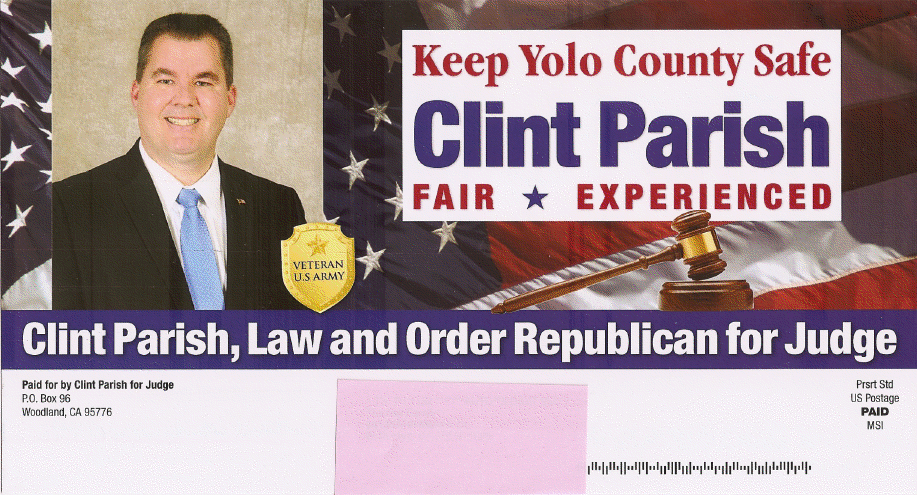 When Clinton Parish decided to Challenge Dan Maguire for judge, he immediately cited the fact that Dan Maguire was a “political appointment” by Governor Arnold Schwarzenegger.
When Clinton Parish decided to Challenge Dan Maguire for judge, he immediately cited the fact that Dan Maguire was a “political appointment” by Governor Arnold Schwarzenegger.
He said, “Political decisions have no place in the court. Last minute political appointments are not in the best interest of Yolo County. I believe the People of Yolo County can make better decisions than Arnold Schwarzenegger as to who should be a Judge in our County.”
“Yolo County deserves better than that,” he told the Sacramento Bee in September of 2011. “It is time to get politics off the bench.”
Even in May, as his campaign was unraveling due to an attack mailer whose core charges are false, Mr. Parish maintained that stance.
“I think people will really start looking at my background and his background, and how each of us got here,” Clinton Parish told a Davis Enterprise reporter. “It points out that he is a product of political privilege.”
What Clinton Parish does not tell reporters is that there is already a process in place far more sophisticated than any information the voters have at hand.
Under state law, the governor cannot simply appoint anyone they want as a judge. Rather they must submit the names of all persons to a Superior Court judgeship to the Commission on Judicial Nominees Evaluation of the State Bar of California.
According to John Poulos, a Professor Emeritus at UC Davis’s School of Law, in a recent op-ed, “The commission assesses each nominee on the basis of impartiality; freedom from bias; industry; integrity; honesty; broad legal experience (e.g., litigation and non litigation experience, legal work for a business or nonprofit entity, experience as a law professor or other academic position, legal work in any of the three branches of government and legal work in dispute resolution); professional skills; intellectual capacity; judgment; community respect; commitment to equal justice; judicial temperament; communication skills; and job-related health.”
He adds, “Based on these qualifications, the commission determines whether the candidate is qualified to be a judge of the Superior Court in California. The commission’s rating (as well as all information gathered during the investigation) is not made public.”
The previous Deputy DA to challenge a judge, James Walker, who challenged Judge Timothy Fall in 2008, was evaluated but did not make the grade.
According to several sources, Clint Parish never submitted his name. We know this because the JNE sends out an email to local attorneys when a name is under consideration.
One source told the Vanguard that when Mr. Walker submitted his name, the attorneys received notice in the mail. No such notice occurred for Mr. Parish, and several attorneys confirmed for the Vanguard.
John Poulos writes as much, “As far as we know, Parish has never been evaluated by the commission and his candidacy is not supported by a single judge. If Parish qualifies in any of the areas evaluated by the commission, we must glean those qualifications from the information he provides us and the statements of his supporters.”
On the other hand, we know that Judge Dan Maguire, who was appointed by the governor, would have had to have been evaluated by the JNE and qualified.
Wrote Professor Poulos, “Given Maguire’s record of intellectual achievement while at Stanford (Phi Beta Kappa), his graduation from Harvard Law School with honors, and his clerking for Judge Andrew Kleinfeld of the U.S. Court of Appeals for the Ninth Circuit (a great honor in the academic legal profession), one would be surprised if Judge Maguire was not rated ‘extremely well qualified’ by the commission.”
Moreover, as Professor Poulos also notes, all of the current judges in Yolo County seem to agree with the commission’s assessment, as they are backing Judge Maguire.
“Of equal importance, each judge knows exactly what the job requires and the character attributes that one must have to be a Superior Court judge. They have worked closely with Maguire since he was sworn into office in 2010,” he adds.
According to Professor Poulos, “The problem is that Parish has not given us much of the information we need to make the necessary comparison between his qualifications and those of Maguire. His website does not address most of the 14 qualifications for judicial office evaluated by the commission and his mailers contain a few bullet points stating simple conclusions.”
He adds, “One of the verifiable facts he offers is ‘Yolo County DA for 10 Years – Prosecuting Over 1,000 cases.’ Qualification 6 tells us that a judicial candidate should have ‘broad legal experience.’ Parish’s experience simply does not meet this criterion. It is experience in the narrow legal specialty of prosecuting criminal cases. Furthermore, we know nothing about the quality of that experience.”
We must remember, a judge must be the most knowledgeable person on the law in the courtroom and he must know a broad range of the law.
Clinton Parish has experience as a criminal attorney for ten years.
As Professor Poulos writes, “We also know that 10 years of doing the same narrow specialty does not broaden one’s understanding of the multitude of legal issues that come before a judge on a daily basis. At best, Parish would learn more and more about less and less. At worst, it would be a dull legal routine as he grinds through the years of doing what he learned years ago.”
But there is more than just that.
Yolo County’s presiding Judge Dave Rosenberg told the Vanguard, “A new judge would normally receive an initial assignment outside their area of specialization.”
Judge Rosenberg reiterated the need to avoid both legal and ethical conflicts.
However, he also agreed on the need for a broad-based understanding of the law.
Judge Rosenberg said, “Judges need to be generalists – particularly on a small bench like Yolo – where we are constantly backing each other up.”
From this standpoint, not only does Clinton Parish’s qualifications fall short, so too does his argument.
He ran what can only be called an unconventional campaign for judge. He appealed to partisanship, to populism, and he made attacks on Arnold Schwarzenegger and Dan Maguire a centerpiece of his campaign.
The problem is that his argument, that the Yolo County voters are better equipped than Governor Schwarzenegger to determine the best candidate for judge, falls short when considering the totality of the process.
The voters will never have the detailed assessment of both candidates that the governor had, the voters cannot weigh the qualifications of Clinton Parish, and most of the voters have never seen Mr. Parish or Judge Maguire at work.
Clinton Parish was probably never going to unseat a sitting judge supported by both his peers and the entire defense bar, and indeed, the entire Yolo County bar sans the District Attorney’s office.
However, he made some odd decisions on what to base his campaign. He argued that Yolo County needed someone with criminal justice experience on the bench – and there is some evidence that it does.
But he never made the clear case that it needed him over all others. He never put in his application for assessment either to the JNE or the voters.
As Professor Poulos argues, “Parish has chosen to support his candidacy, for the most part, not by giving us assessable facts on the needed requirements, but on endorsements and an attack on Maguire’s character. Indeed, Parish’s attack is the centerpiece of his campaign.”
It is our view that judges should probably not be elected, for precisely the issues and reasons that arise in this election.
However, California, in trying to break the influence of special interests a century ago, established a duel-system as a check against corruption and co-option of the governor and legislature.
Ironically, it was this case of corruption of the process that Clinton Parish tried to create and exploit that ultimately doomed him, when he also ironically failed to properly investigate and vet the charges he was laying forth.
For that error of both omission and commission alone, Mr. Parish deserves his own fate. The fate is that of ridicule, scorn and the loss of support of some of his closest allies, including his own boss.
—David M. Greenwald reporting





Our man clinton parish justified his candidacy with the slogan – “It is time to get politics off the bench.”
“He ran what can only be called an unconventional campaign for Judge. He appealed to partisanship, to populism, and he made attacks on Arnold Schwarzenegger and Dan Maguire a centerpiece of his campaign.”
Does anyone else see the irony here?
I guess I should have characterized the above as [i]hypocracy[/i], which would actually be a better fit considering clinton parish’s demeanor. I think David got this one right – “Mr. [p]arish deserves his own fate. The fate is that of ridicule [and] scorn.”
OK, now I’m depressed.
First of all, now that the election is over (and clinton parish lost in devastating fashion), there will be no more weekly public displays of arrogance and buffoonery from the parish camp.
Secondly, clinton parish got over 3,000 complete nincompoops to vote for him! Holy crap! I didn’t know we had that many uneducated and idiotic people in this county!